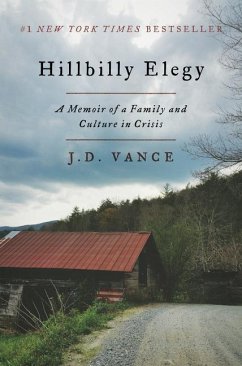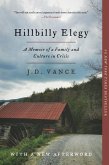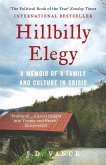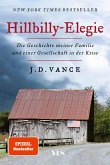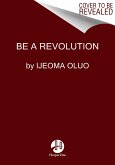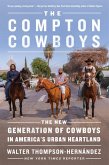Hillbilly Elegy recounts J.D. Vance's powerful origin story...
From a former marine and Yale Law School graduate now serving as a U.S. Senator from Ohio and the Republican Vice Presidential candidate for the 2024 election, an incisive account of growing up in a poor Rust Belt town that offers a broader, probing look at the struggles of America's white working class.
THE #1 NEW YORK TIMES BESTSELLER
"You will not read a more important book about America this year."-The Economist
"A riveting book."-The Wall Street Journal
"Essential reading."-David Brooks, New York Times
Hillbilly Elegy is a passionate and personal analysis of a culture in crisis-that of white working-class Americans. The disintegration of this group, a process that has been slowly occurring now for more than forty years, has been reported with growing frequency and alarm, but has never before been written about as searingly from the inside. J. D. Vance tells the true story of what a social, regional, and class decline feels like when you were born with it hung around your neck.
The Vance family story begins hopefully in postwar America. J. D.'s grandparents were "dirt poor and in love," and moved north from Kentucky's Appalachia region to Ohio in the hopes of escaping the dreadful poverty around them. They raised a middle-class family, and eventually one of their grandchildren would graduate from Yale Law School, a conventional marker of success in achieving generational upward mobility. But as the family saga of Hillbilly Elegy plays out, we learn that J.D.'s grandparents, aunt, uncle, and, most of all, his mother struggled profoundly with the demands of their new middle-class life, never fully escaping the legacy of abuse, alcoholism, poverty, and trauma so characteristic of their part of America. With piercing honesty, Vance shows how he himself still carries around the demons of his chaotic family history.
A deeply moving memoir, with its share of humor and vividly colorful figures, Hillbilly Elegy is the story of how upward mobility really feels. And it is an urgent and troubling meditation on the loss of the American dream for a large segment of this country.
From a former marine and Yale Law School graduate now serving as a U.S. Senator from Ohio and the Republican Vice Presidential candidate for the 2024 election, an incisive account of growing up in a poor Rust Belt town that offers a broader, probing look at the struggles of America's white working class.
THE #1 NEW YORK TIMES BESTSELLER
"You will not read a more important book about America this year."-The Economist
"A riveting book."-The Wall Street Journal
"Essential reading."-David Brooks, New York Times
Hillbilly Elegy is a passionate and personal analysis of a culture in crisis-that of white working-class Americans. The disintegration of this group, a process that has been slowly occurring now for more than forty years, has been reported with growing frequency and alarm, but has never before been written about as searingly from the inside. J. D. Vance tells the true story of what a social, regional, and class decline feels like when you were born with it hung around your neck.
The Vance family story begins hopefully in postwar America. J. D.'s grandparents were "dirt poor and in love," and moved north from Kentucky's Appalachia region to Ohio in the hopes of escaping the dreadful poverty around them. They raised a middle-class family, and eventually one of their grandchildren would graduate from Yale Law School, a conventional marker of success in achieving generational upward mobility. But as the family saga of Hillbilly Elegy plays out, we learn that J.D.'s grandparents, aunt, uncle, and, most of all, his mother struggled profoundly with the demands of their new middle-class life, never fully escaping the legacy of abuse, alcoholism, poverty, and trauma so characteristic of their part of America. With piercing honesty, Vance shows how he himself still carries around the demons of his chaotic family history.
A deeply moving memoir, with its share of humor and vividly colorful figures, Hillbilly Elegy is the story of how upward mobility really feels. And it is an urgent and troubling meditation on the loss of the American dream for a large segment of this country.

Ein Hillbilly erzählt, wie seine Leute den Anschluss an Amerika verloren haben
Mamaw war zwölf, als sie einen Kuhdieb anschoss. Einige Zeit später baggerte ein Fremder das Mädchen an: "Ich will dein Höschen vernaschen." Da holte der Bruder einen Schlüpfer und sorgte mit vorgehaltenem Messer dafür, dass sich der Mann den Wunsch bis auf den letzten Bissen erfüllte. Mit vierzehn wurde Mamaw schwanger. Sie stürzte sich mit ihrem Freund in den Migrationsstrom, der in den vierziger Jahren Abertausende Arme aus den Appalachen in die neuen Industriezentren des Nordens spülte. Mamaws erstes Baby überlebte nur wenige Tage. Ihr Mann fand in Ohio aber gute Arbeit in einem Stahlwerk. Insofern erfüllte sich das Paar den amerikanischen Traum.
Im Innern jedoch blieben sie Hillbillys aus Kentucky. Als Mamaws Ehemann einmal betrunken heimkam und auf dem Sofa einschlief, übergoss sie ihn mit Benzin und warf ein brennendes Streichholz hinterher. Sie hatte ihn gewarnt, und nun gebot es die Ehre, Wort zu halten. Teilnahmslos schaute Mamaw zu, wie ihre elfjährige Tochter die Flammen erstickte. Jahrzehnte später sollte ein Enkel bei ihr wohnen. Brachte der Teenager den Müll nicht heraus, schalt sie ihn als "faules Stück Scheiße".
Dieser Junge ist J.D. Vance, der es zum Investmentbanker gebracht und jetzt mit 31 Jahren seine Memoiren vorgelegt hat. Und "Mamaw", also Oma, war der eine gute Mensch in seinem Leben. Bei ihr gab es Mutterliebe, einen waffenbewehrten Zufluchtsort und eine echte Hillbilly-Heimat. Vance erzählt von der oft nur oberflächlich geglückten Integration der Amerikaner mit irisch-schottischen Wurzeln, die massenhaft aus den Appalachen fortzogen. "Innerhalb von zwei Generationen hatten die verpflanzten Hillbillys bei den Einkommen ... mit den Einheimischen gleichgezogen. Doch hinter dem finanziellen Erfolg verbarg sich kulturelle Fremdheit."
Das Buch "Hillbilly Elegy" ist zugleich die dramatische Geschichte einer Kindheit, in der die Mutter J.D. erst allein und dann gar nicht mehr erzog. Zig Ehen und Partnerschaften der Krankenschwester endeten in bürgerkriegsähnlichen Schlachten. Die Mutter wurde erst tabletten-, dann heroinsüchtig. Einmal tauchte sie nach langer Abwesenheit bei Mamaw auf, wo J.D. inzwischen wohnte, und befahl ihrem erschrockenen Sohn, in einen Becher zu pinkeln. Sie musste eine Urinprobe abgeben, war aber wieder high geworden.
Vance beschreibt in seinem Buch den Niedergang jener Industriestädte, die einst nicht nur Hillbillys anlockten. Immer mehr Firmen setzten auf Roboter oder fanden billige Arbeiter in fernen Ländern. Und doch erzählt Vance eine kaum zu fassende Erfolgsgeschichte: Nachdem die Marineinfanterie den Autor nicht nur für den Krieg, sondern auch fürs Leben ertüchtigt hatte, schaffte er es bis auf die Yale Law School. Dort wurde ihm nicht zuletzt klar, was er über die Welt bis dahin alles nicht wusste. Beim Rekrutierungsdinner einer Anwaltskanzlei fand er mit Ende zwanzig heraus, dass es sprudelndes Wasser gibt. Er spuckte es erschrocken aus. "Reiche und Arme, Gebildete und Ungebildete, Oberklasse und Arbeiterklasse - ihre Angehörigen leben zunehmend in zwei verschiedenen Welten. Als kultureller Auswanderer von der einen Gruppe in die andere ist mir das sehr bewusst." Gegenüber den Zurückgebliebenen habe er sich manchmal wie ein Verräter gefühlt, bekennt Vance.
Im Wahljahr 2016 kommt sein Buch wie gerufen. Es leuchtet eine Kluft aus, deren Existenz viele Amerikaner verdrängen wollten - wohlgemerkt eine Kluft in der weißen Mehrheitsbevölkerung. Donald Trump hat den "vergessenen Männern und Frauen" versprochen: "Ich bin eure Stimme." Vance erklärt dem Leser eine Parallelgesellschaft, in der Trump damit Gehör findet. Der Autor zitiert dabei Studien, die das Los der Hillbillys seiner Meinung nach treffend beschreiben - nur dass es in den besagten Büchern um Afroamerikaner ging, die aus den Südstaaten in den Norden kamen.
Dass ein Präsident wie Barack Obama unter Hillbillys als eine Art Außerirdischer gelte, habe denn auch wenig mit seiner Hautfarbe zu tun. "Nichts an ihm hat Ähnlichkeit mit den Menschen, die ich als Heranwachsender bewundert habe", erklärt Vance. "Sein Akzent - sauber, perfekt, neutral - ist fremd; sein Werdegang so eindrucksvoll, dass er einem Angst einjagt; ... er strahlt das Selbstvertrauen eines Mannes aus, der weiß, dass die moderne amerikanische Meritokratie für ihn aufgebaut wurde" - und eben nicht für die Arbeiter, die vor lauter Schwärmen über ihr Ethos der "harten Arbeit" oft übersähen, wie faul sie seien. Obama, fügt Vance an, "trifft uns im Herzen unserer tiefsten Verunsicherung. Er ist der gute Vater, der viele von uns nicht sind. ... Seine Frau erklärt uns, dass bestimmtes Essen nicht gut für unsere Kinder ist, und wir hassen sie dafür - weil wir wissen, dass sie recht hat." Unter Hillbillys sei es bis heute gängig, schon den Jüngsten Brausegetränke ins Fläschchen zu füllen.
Von außen auf das Milieu zu gucken, dem er entstammt, hat J.D. Vance fast das Herz gebrochen. In ihrer zum Teil durch eigene Schuld perpetuierten Armut hätten sich die Hillbillys immer durch ihre Vaterlandsliebe definiert. Doch es gebe keine Helden mehr, zu denen ganz Amerika aufblicke. "Wir liebten das Militär, aber es gab keinen George Patten in der modernen Armee." Auch das Raumfahrtprogramm bringe keine wahren Helden mehr hervor. Fast nichts verbinde seine Leute noch mit dem Gewebe, das Amerika im Kern zusammenhalte. Jetzt gibt es Trump und sein Versprechen, Amerika "wieder großartig zu machen". Wenn der weißen Arbeiterklasse eins fehle, schreibt J.D. Vance, dann "das Gefühl, dass es auf unsere eigenen Entscheidungen ankommt".
ANDREAS ROSS
J.D. Vance: Hillbilly Elegy. A Memoir of a Family and Culture in Crisis. Verlag Harper Collins, New York 2016. 264 Seiten.
Alle Rechte vorbehalten. © F.A.Z. GmbH, Frankfurt am Main
"[A] compassionate, discerning sociological analysis...Combining thoughtful inquiry with firsthand experience, Mr. Vance has inadvertently provided a civilized reference guide for an uncivilized election, and he's done so in a vocabulary intelligible to both Democrats and Republicans. Imagine that." Jennifer Senior, New York Times

